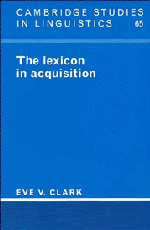Book contents
- Frontmatter
- Contents
- Acknowledgments
- 1 The lexicon: words old and new
- 1 LEXICAL ACQUISITION
- 2 CASE STUDIES OF LEXICAL INNOVATION
- 8 Words for things
- 9 More words for things
- 10 Words for agents and instruments
- 11 Words for actions
- 12 Words for undoing actions
- 3 CONCLUSION
- Bibliography
- Index of names
- Index of subjects
9 - More words for things
Published online by Cambridge University Press: 05 July 2011
- Frontmatter
- Contents
- Acknowledgments
- 1 The lexicon: words old and new
- 1 LEXICAL ACQUISITION
- 2 CASE STUDIES OF LEXICAL INNOVATION
- 8 Words for things
- 9 More words for things
- 10 Words for agents and instruments
- 11 Words for actions
- 12 Words for undoing actions
- 3 CONCLUSION
- Bibliography
- Index of names
- Index of subjects
Summary
To what extent do children acquiring other languages rely on transparency, simplicity, and productivity? To what extent are the predictions of these principles affected by the typology of the language? For example, if a language makes little or no use of compounding, that option will not be available. This in turn will affect children's reliance on simplicity, transparency, and productivity. This chapter surveys data from some Romance and some Slavic languages, as well as from Hungarian (Finno-Ugric) and Hebrew (Semitic). For each language, I evaluate the predictions of each principle against the kinds of novel nouns children construct.
Romance
The Romance languages, unlike Germanic, rely far more on derivation than compounding for word formation. New nouns are usually formed with suffixes. In French, for example, nouns for things can be formed with suffixes like -eau or -on, as in the established rouleau ‘roller, bearing’ or jeton ‘token, chip’; nouns for agents and instruments with -eur, as in chanteur ‘singer’; nouns for activities or states with -age, -esse, or -ment, as in séchage ‘(activity of) drying,’ sagesse ‘goodness, wisdom,’ and changement ‘change.’ While French-speakers rely heavily on derivation with affixes, they also make some use of zero-derivation: nouns can be formed from verb infinitives, as in le tomber ‘the fall/the action of falling’ or le jeter ‘the action of throwing/the throw.’
- Type
- Chapter
- Information
- The Lexicon in Acquisition , pp. 160 - 176Publisher: Cambridge University PressPrint publication year: 1993



